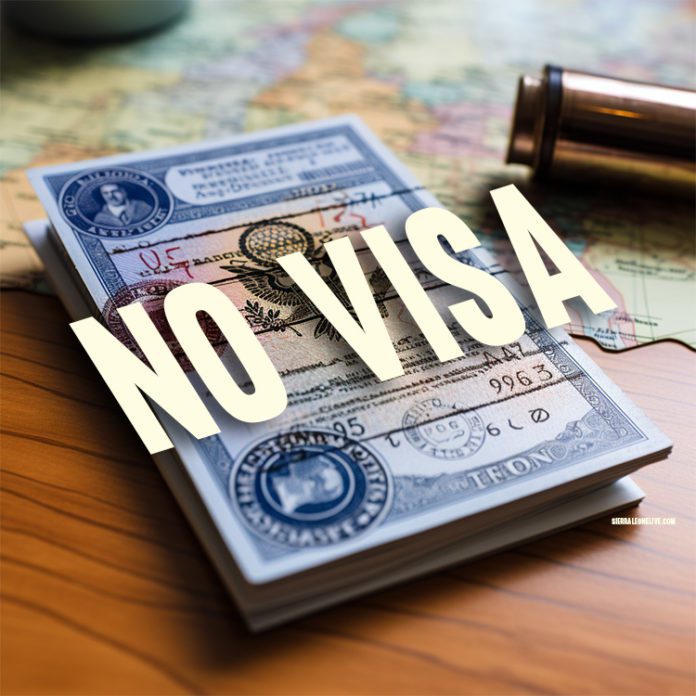
Visa Restriction Policy and the Dawn of Democracy in Sierra Leone: An Intersection of Reality and Fiction
By the Sierra Leone Live Team
When the United States Secretary of State, Antony J. Blinken, released a press statement on August 31, 2023, announcing a visa restriction policy for undermining the democratic process in Sierra Leone, it couldn’t have been more in sync with the fictional account penned down by Bhai-Dhawa Sesay in “Echoes of Democracy: Unrigging Sierra Leone’s Election.” While one account reflects international policy, the other captures the grassroots perspective in Sierra Leone. These two narratives intersect at multiple points, weaving a complex tapestry of democracy, international relations, and human aspirations.
Unveiling the Corruption
Both Blinken’s policy and Sesay’s fictional account deal head-on with the rampant corruption that has marred Sierra Leone’s electoral process. Blinken’s announcement specifically aims to address “manipulation or rigging of the electoral process; intimidation of voters, election observers, or civil society organizations through threats or acts of physical violence; or the abuse or violation of related human rights”. Similarly, Sesay’s chapter 10, ‘A New Dawn’ unfolds the depth of corruption, encapsulated in rigged ballot boxes and coerced voters, ultimately leading to international scrutiny.
People Versus Power Elites
Blinken’s press statement clarifies that the visa restrictions are not against the people of Sierra Leone but against those corrupt factions undermining democracy. This mirrors Sesay’s portrayal of the Sierra Leoneans as victims of a corrupted elite. The fictional populace stands as a collective symbol of resilience and hope, eager for a change that will bring about a truly democratic process. The parallels are uncanny: The world rallies around the common people, whether it’s through visa restrictions or global diplomatic resolutions in Sesay’s narrative.
The International Eye
Both accounts showcase the role of the international community in upholding democracy. Blinken’s announcement serves as diplomatic pressure, while in Sesay’s account, they have deployed UN resolutions and international observers to ensure a free and fair election. These global interventions strip the corruption bare and amplify the demand for justice.
Public Sentiment and Aftermath
Sesay’s tale concludes with a sense of cautious optimism and empowerment among the people. With the intervention and unrelenting gaze of the international community, there is a collective belief that the subsequent elections would be free of corruption. Similarly, Blinken’s announcement aims to provide external assurance that they will pursue justice, setting a precedent that could deter future corruption.
The Momentum of Democratic Aspirations
The two narratives reach a crescendo in their emphasis on momentum. The fictional people of Sierra Leone feel an unstoppable surge of empowerment, buoyed by the global spotlight. Blinken’s visa restrictions, on the other hand, aim to keep that momentum alive by ensuring consequences for those attempting to halt the democratic wheels from turning.
Family Impact
An intriguing point of intersection is the potential familial ramifications. Blinken’s policy extends restrictions to family members of those responsible for undermining democracy. This extends the circle of accountability, much like in Sesay’s fiction, where the rot within society doesn’t merely rest with individuals but seeps into the familial structures that often passively condone corruption.
A New Dawn
Both narratives capture the spirit of a “New Dawn,” a term explicitly used in Sesay’s story. While Sesay’s account ends with the first day of Sierra Leone’s “new future,” Blinken’s policy sets the diplomatic and legal mechanisms that could very well make that future possible.
In conclusion, Antony J. Blinken’s visa restriction policy and Bhai-Dhawa Sesay’s “Echoes of Democracy” both underscore the larger narrative of democratic aspirations in Sierra Leone. One gives us a view from the global stage; the other provides an intimate look at the grassroots. Together, they form a compelling dialogue on the importance of international solidarity, ethical governance, and the indomitable human spirit in the fight for a fair and transparent democratic process in Sierra Leone.



